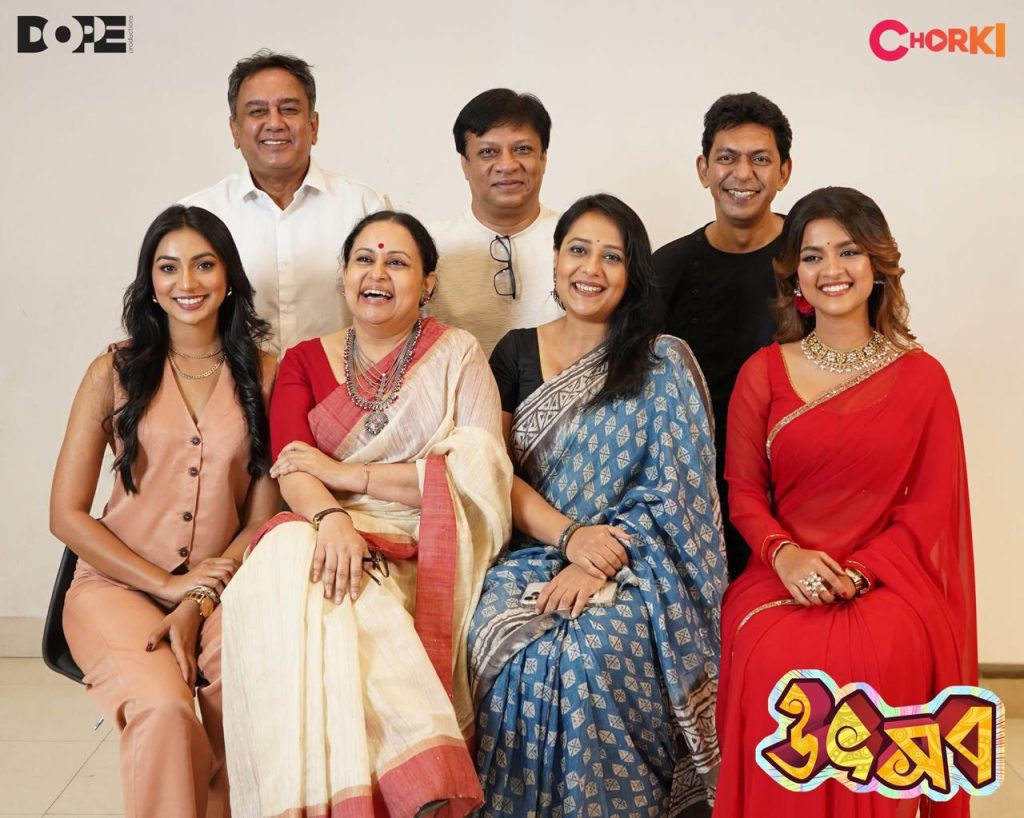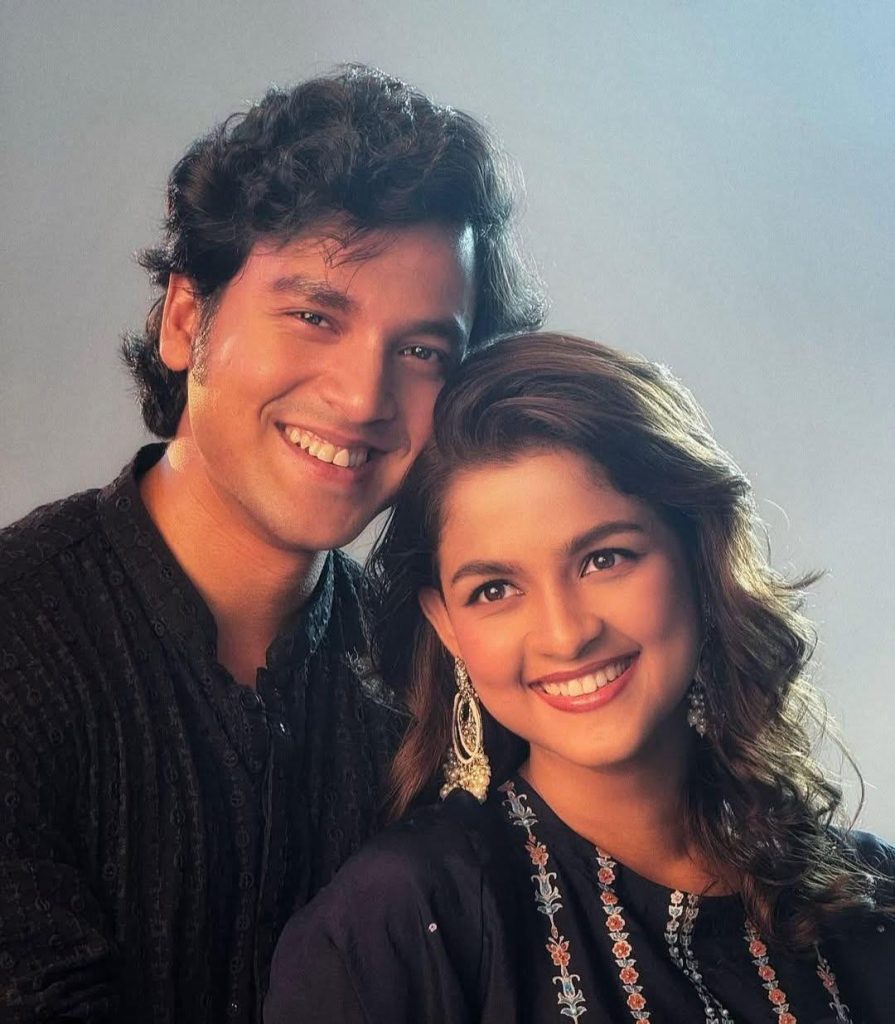Tanim Noor’s Utshob (2025), released on June 7, 2025 during Eid al-Adha, marks a significant tonal shift in the landscape of Bangladeshi cinema. Produced by Dope Productions, with Chorki and Laughing Elephant as co-producers, the film consciously breaks away from the industry’s Eid pattern of action-packed thrillers. Instead, it delivers a nuanced, culturally resonant comedy-drama for families—positioning itself as both a festive celebration and a social reflection.
At its core, Utshob is a brilliant cultural transposition of Charles Dickens’ A Christmas Carol. Rather than a direct remake, Noor offers a meticulously contextualized adaptation, reimagining Dickens’ Victorian morality tale within the social, spiritual, and cultural fabric of modern-day Dhaka during Eid. In doing so, the film not only preserves the narrative’s universal message of redemption but imbues it with a deeply Bangladeshi soul, making it uniquely accessible to local audiences while offering international viewers a rare cultural lens.
Where Dickens gave us Scrooge, Noor introduces Jahangir (Zahid Hasan)—a selfish, apathetic, and somewhat embittered middle-aged man in Mohammadpur. Labelled as khaishta (incorrigible), Jahangir becomes the vessel through which the film explores personal transformation, communal responsibility, and the spiritual weight of Eid.
The familiar ghostly structure of A Christmas Carol remains intact—three visitors arrive to confront him with his past, present, and possible future. But in Utshob, this structure is layered with local cultural motifs, including a “screening of his past at Madhumita Hall,” a witty and emotionally loaded meta-cinematic device that turns memory into movie, emphasizing the medium’s role in preserving and interrogating social memory.
One of the film’s standout declarations—”In the film of life, there is no such thing as a main character”—functions as its philosophical core. This idea directly challenges the increasing individualism of urban Bangladeshi society, advocating for a return to collective empathy. In reframing Eid not just as ritual but as an ethos of togetherness and reflection, Utshob critiques the erosion of communal bonds while celebrating traditions like door-to-door Eid dinners, rekindling their lost emotional power.
The inclusion of a Bihari biryani chef who speaks Urdu is subtle but impactful, grounding the film in social realism and nodding toward Dhaka’s multiethnic layers. This deliberate detail highlights Noor’s quiet commitment to inclusive storytelling, positioning Utshob as both nostalgic and progressive.
The structure is deceptively simple—a clear three-act progression modeled on Dickens. But within that frame, Noor introduces non-linear storytelling, most notably via the “film within a film” concept that transforms a character’s backstory into literal cinema. This move cleverly invokes the role of memory, performance, and audience reflection in both film and life.
Equally important is the film’s meta-humor and self-awareness, often delivered by its iconic ensemble. When Jaya Ahsan’s character quips, “Shesh kobe hole giye cinema dekhechhen?” (“When was the last time you went to the cinema hall?”), it’s not just a line—it’s a direct provocation to an audience estranged from the theater-going habit. This reflexive commentary on the state of cinema echoes the film’s broader message: community is forged through shared experience, and cinema can still be a sacred communal space.
The film is a love letter to Bangladeshi television’s golden age, and the casting reflects this. Zahid Hasan, as Jahangir, grounds the story with a performance that evolves from comic indifference to haunting vulnerability. His transformation feels earned, layered, and emotionally resonant.

The ghosts—Chanchal Chowdhury (Past), Jaya Ahsan (Present), and Aupee Karim (Life’s Struggles)—are not only narratively powerful but symbolically cast. These stars, icons of yesteryear TV, bring with them a cultural memory that adds depth to their roles. Their self-referential lines—Chanchal’s quip about his omnipresence on TV, Aupee’s nod to her long screen absence—blur fiction and reality, inviting the audience into a playful, nostalgic complicity.
Among newer talents, Sadia Ayman as Jesmin is a standout, offering a fresh and relatable perspective while avoiding caricature. Her “sweet chemistry” with Young Jahangir (Played by Shommo Jyoti )brings lightness and modernity to the intergenerational dialogue at the film’s heart.

Noor’s directorial choices are marked by clarity of vision and tonal control. His ability to modulate between humor, horror, and pathos ensures the film never feels tonally jarring. Dialogue is sharply written, filled with local idioms, literary flourishes, and nostalgic callbacks—such as the reference to Aj Robibar—that delight longtime viewers without alienating newcomers.
Rashed Zaman’s cinematography contributes to the film’s “visual splendor,” alternating between grounded urban realism and lyrical grandeur. Wide shots juxtapose the vastness of Dhaka with intimate character studies, reinforcing the tension between personal detachment and collective interconnection.
Musically, Jahid Nirob’s compositions are rich and thematically intertwined. His haunting reinterpretation of “O mon Romjaner Oi Rojar Sheshe” as a horror-tinged motif is inspired—a bold sonic choice that underlines the emotional and psychological dissonance in Jahangir’s journey. The inclusion of Artcell’s “Dhushor Shomoy” and Level Five’s “Tumi” further deepens the film’s connection with different generational memories and moods.
Shaiba Talukder’s sound design is equally instrumental in maintaining pacing and mood. The fusion of foley, ambient sound, and music blends seamlessly, making Utshob not just a visual but a sensorially immersive experience.
The film’s tongue-in-cheek tagline—“Warning: Watching this film without family is prohibited”—perfectly encapsulates its tone: humorous, self-aware, and inviting. The strategy worked. Despite facing high-budget competition and limited promotional push, packed screenings and positive word-of-mouth proved there’s still a large audience craving family-friendly, intelligent cinema.
In breaking from the “dark phase” of action copycat films, Utshob reclaims Eid cinema as a space for communal joy, reflective storytelling, and cultural intimacy. By creating a commercially viable, thematically rich film that resonates across age groups, Noor lays the groundwork for a new path forward in Bangladeshi cinema.
Tanim Noor’s Utshob is a truly rare creation: an ensemble drama that transcends a mere smart adaptation. It’s a poignant celebration of Bangladeshi identity, a reclaiming of shared narratives, and a profoundly heartfelt answer to a divided cultural scene. The film masterfully interweaves classic storytelling, modern relevance, and nostalgic warmth into a distinct cinematic journey.
Perhaps its most significant achievement lies in its ability to fuse spiritual reflection with cinematic festivity, transforming Utshob from simply a film for Eid into a film about Eid. It entertains, mends, and serves as a powerful reminder that in the grand narrative of existence, everyone holds significance.
With Utshob, Tanim Noor has created something rare—an ensemble drama that celebrates not just what we pretend to be during holidays, but what we long to become when we think no one is watching. It’s not just a film about ghosts, but about the selves we abandon, the futures we fear, and the grace that might still be possible if we learn to look inward.
Producer & Director: Tanim Noor | Genre: Comedy‑Drama | Country: Bangladesh
Cinematography: Rashed Zaman | Screenplay: Ayman Asib Shadhin & Samiul Bhuiyan |
Edited By: Saleh Sobhan Auneem | Casting Director & Costume Designer: Tania Rahman | Sound Design and Mixing: Sayba Talukdar | Music: Jahid Nirob | Makeup Artist : MD. Forhad Reza Milon | Cast: Zahid Hasan, Jaya Ahsan, Chanchal Chowdhury, Aupee Karim, Afsana Mimi, Tariq Anam Khan, Sadiya Ayman, Shommo Jyoti, Monirul Islam Rubel, Apurba Majumdar, Shangkha Zaman, Bushra Humayra Farooq, Azad Abul Kalam, Intekhab Dinar, Sunerah Binte Kamal
Abu Shahed Emon, Filmmaker


